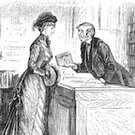Title: All Sorts and Conditions of Men
Author and Title: Walter Besant. All Sorts and Conditions of Men: An Impossible Story
First Edition: London: Chatto and Windus, 1882. 3 volumes, post 8vo, 31s 6d.
Serializations:
- Belgravia, illustrated by Fred Barnard, January 1882 to December 1882 (monthly)
- The Sheffield Daily Telegraph, 7 January 1882 to 1 July 1882 (weekly)
- The Cardiff Times, 7 January 1882 to 1 July 1882 (weekly)
- Manchester Courier, 7 January 1882 to 1 July 1882 (weekly)
- Leicester Chronicle, 14 January 1882 to 1 July 1882 (weekly)
- Glasgow Weekly Mail, 14 January 1882 to 15 July 1882 (weekly)
Summary: Illustrated by Fred Barnard. Angela Messenger, a Newnham girl and the heiress to an East End brewery fortune, passes up the intellectual life for a cause. Her disgust centers on the political economy she learns at college: "a so-called science" that "treated of men and women as skittles." She plans to move to the neighborhood of her brewery and disguising herself as a dressmaker. The second central character Harry Goslett has been raised by Lord Jocelyn Le Breton in ignorance of his true birth: Lord Jocelyn has taken the orphan boy away from his Uncle Bunker in order to bring him up as a gentleman. When Lord Jocelyn tells Harry that his father was a poor sergeant from the East End, Harry decides to return and see from whence he came. Both Angela and Harry—the former disguised as a dressmaker named Miss Kennedy and the latter disguised as a cabinet maker,—unknown to each other, move to the same East End boarding house, Mrs. Bormalack's, where they mingle with a cast of eccentric characters: Lord and Lady Davenant, two Americans pressing a royal claim; the Professor, a magician; Daniel Fagg, an Australian shoemaker working on a scholarly book on the ancient alphabet; Josephus Coppin, Harry's cousin who works at the brewery and lives under a cloud of scandal involving some missing money; and Mr. Maliphant, an old, senile ship's figures carver. Using her great wealth surreptitiously, Angela, as Miss Kennedy, opens an idealistic Dressmakers' Association: she organizes the work day around generous "play" breaks at lawn tennis and gymnastics, a free dinner, and cultural improvement in the evenings where she teaches the girls music, singing, and dancing. Angela has secretly financed the entire operation through the beneficence of "Miss Messenger," who not only provides the building but also places her considerable dress orders there. The goal of the operation, according to Angela, is to make the girls discontent: by showing them a higher culture, they will strive to improve. In her conversations with Harry, Angela resolves on another, more ambitious project: a Palace of Delight. In a moment of "what if," Harry offers the Palace as the solution to the social problems of the East End which, continuing the fantasy, he and Angela draw up in a prospectus. Angela takes this plan and, as Miss Messenger, charges her lawyers and an architect to build it secretly in the neighborhood. Between starting the construction of the Palace of Delight and opening it, Angela again surreptitiously uses her wealth to solve some of her fellow boarders' problems. She gets Harry a well-compensated job as a cabinet maker in her brewery; she finances the claim of the Davenants and puts them up in her Portman Square mansion; and she finances the writing of Danial Fagg's book and publishes it. Meantime, Harry discovers the missing money and a deed that both removes the scandal from his cousin Josephus and shows that his Uncle Bunker has cheated Harry out of some East End property (conveniently the very house that Angela uses for her Dressmakers' Association). Predictably, Harry and Angela fall in love, and Angela arranges their marriage to coincide with the grand opening of the Palace of Delight. At the ceremony she reveals her identity to the surprised Harry and she gives the Palace of Delight to the people of the neighborhood. The novel ends happily with the narrator's editorial comment, "The Palace of Delight is in working order now, and Stepney is already transformed. For the first time they understood that life may be happy: for the first time they ressolved that they would find out for themselves the secret of happiness." The novel inspired the real-life People's Palace of East London a few years later. (TJB)
Title Tags:
References: BL; EC; Sutherland
Texts
- Search for title at The Online Books Page (please note: the search will take you out of At the Circulating Library)
